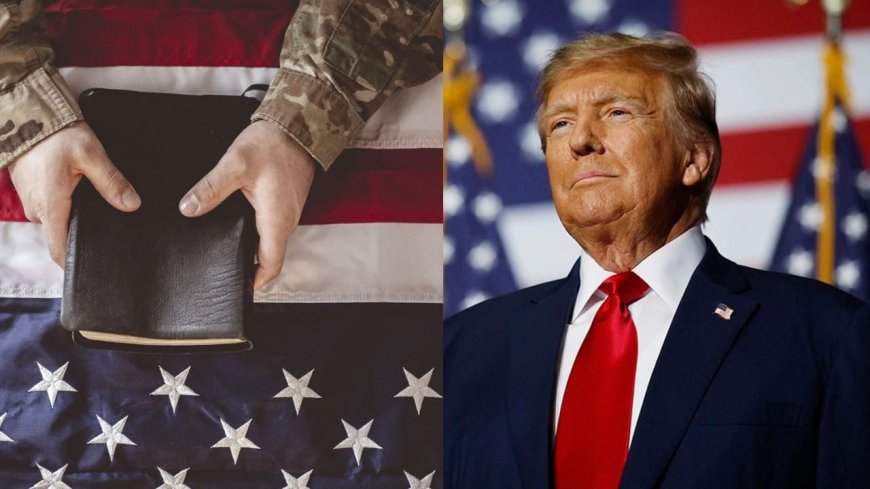Trump Vows to End Birthright Citizenship on Day 1: Implications for Indians
After taking office, Donald Trump intends to revoke birthright citizenship, which could have an effect on the 4.8 million Indian-Americans who now reside in the United States. In keeping with his campaign pledge to limit immigration, Donald Trump has pledged to terminate birthright citizenship as soon as he takes office in January. The contentious plan […] The post Trump Vows to End Birthright Citizenship on Day 1: Implications for Indians first appeared on Storify News.

After taking office, Donald Trump intends to revoke birthright citizenship, which could have an effect on the 4.8 million Indian-Americans who now reside in the United States.
In keeping with his campaign pledge to limit immigration, Donald Trump has pledged to terminate birthright citizenship as soon as he takes office in January.
The contentious plan aims to break a long-standing American custom that ensures citizenship to anybody born in the United States, regardless of the immigration status of their parents. This policy has been in effect for more than 150 years and is protected by the US Constitution’s 14th Amendment.
Birthright citizenship: what is it?
Anyone born in the United States is automatically granted U.S. citizenship by virtue of birthright. Children born to someone who is in the nation illegally or who is in the US on a tourist or student visa and intends to return home are covered by this decades-old law.
The 14th Amendment, which was enacted in 1868, declares that “All persons born or naturalized in the United States, and subject to the jurisdiction thereof, are citizens of the United States and of the State wherein they reside.” This serves as its foundation. Originally, this clause was intended to give citizenship to former slaves and their offspring.
Not all nations follow this procedure, and Trump and his followers have said that the system is being misused and that more requirements should be placed on obtaining U.S. citizenship.
Nonetheless, the policy’s detractors argue that doing away with it would have significant repercussions, especially for infants born in the US to undocumented immigrants or tourists on temporary visas.
Trump’s take on birthright citizenship
During an interview this week, Trump said he “absolutely” planned to halt birthright citizenship once in office.
“We’re going to end that because it’s ridiculous,” he added.
The President-elect argued that it enables “birth tourism,” where pregnant women enter the US with the sole intention of giving birth in order to secure US citizenship for their child. “We’re going to have to get it changed,” Trump said. “We’ll maybe have to go back to the people. But we have to end it.”
Despite bringing up the topic during his first term, Trump failed to make any significant headway in abolishing birthright citizenship. But this time, the president-elect is resolved to move quickly, even though he is aware that doing so would be fraught with constitutional and legal issues.
Political and legal obstacles to overcome
The 14th Amendment was approved by Congress in July 1868 following the Civil War. All citizens, including Black people, were guaranteed citizenship by that amendment.
The US Supreme Court’s 1898 decision that Wong Kim Ark, a Chinese immigrant born in San Francisco, was a US citizen due to his state birth was a landmark case in the history of birthright citizenship. Following a journey overseas, the federal authorities attempted to bar him from returning to the country on the grounds that, according to the Chinese Exclusion Act, he was not a citizen.
“Simply crossing the border and having a child should not entitle anyone to citizenship,” stated Eric Ruark, head of research for NumbersUSA, an organization that supports lower immigration. Ending birthright citizenship, according to Ruark and other conservatives, would lessen the incentive for illegal immigration.
The proposal’s detractors caution that it would result in the creation of a new social and political class in the US that is denied full rights. The vice president of the immigration-friendly Cato Institute, Alex Nowrasteh, referred to Trump’s proposal as “a non-starter.” “I don’t think his claims are particularly true. Nowrasteh remarked, “He has been saying things like this for almost ten years.” “He didn’t do anything to further this agenda when he was president before.”
Effects on Foreigners
Experts have noted that changing the regulation could have an impact on a significant number of US citizens. For example, according to Pew Research, there are over 4.8 million Indian-Americans in the United States, of whom 1.6 million were born there. According to the revised idea, these people would no longer possess proof of citizenship.
Trump recently voiced concerns about severing families, implying that if birthright citizenship were abolished, families—including children of US citizens—would have to be deported together.
Since birth certificates are presently the main form of citizenship documentation, the American Immigration Council issued a factsheet in 2011 warning that removing birthright citizenship would make it more difficult for US residents to prove their citizenship. Removing birthright citizenship would have a substantial administrative burden on the US government and impact millions of American children, according to the factsheet.
Exciting news! Storify News is now on WhatsApp Channels. Subscribe today by clicking the link and stay updated with the latest news! Click here!
Disclaimer: This article has been written by the author and reflects their personal opinions and views. It does not necessarily represent the views or stance of Storify News. Readers are advised to verify the information and make their own informed decisions.
The post Trump Vows to End Birthright Citizenship on Day 1: Implications for Indians first appeared on Storify News.






































